Related Research Articles

Savoy opera was a style of comic opera that developed in Victorian England in the late 19th century, with W. S. Gilbert and Arthur Sullivan as the original and most successful practitioners. The name is derived from the Savoy Theatre, which impresario Richard D'Oyly Carte built to house the Gilbert and Sullivan pieces, and later those by other composer–librettist teams. The great bulk of the non-G&S Savoy Operas either failed to achieve a foothold in the standard repertory, or have faded over the years, leaving the term "Savoy Opera" as practically synonymous with Gilbert and Sullivan. The Savoy operas were seminal influences on the creation of the modern musical.
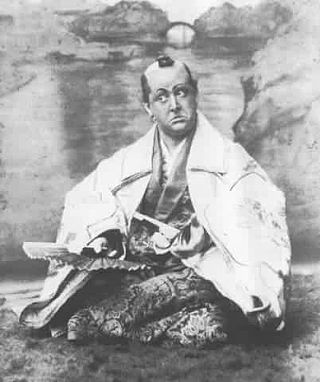
Rutland Barrington was an English singer, actor, comedian and Edwardian musical comedy star. Best remembered for originating the lyric baritone roles in the Gilbert and Sullivan operas from 1877 to 1896, his performing career spanned more than four decades. He also wrote at least a dozen works for the stage.
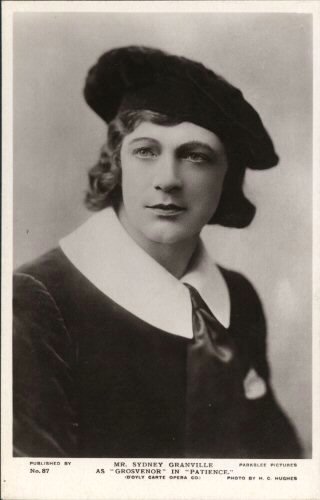
Sydney Granville was an English singer and actor, best known for his performances in the Savoy Operas with the D'Oyly Carte Opera Company.

After All! is a one-act comic opera with a libretto by Frank Desprez and music by Alfred Cellier. It was first performed at the Savoy Theatre under the management of Richard D'Oyly Carte, along with H.M.S. Pinafore and another short piece, Cups and Saucers, from December 1878 to February 1880.

Cups and Saucers is a one-act "satirical musical sketch" written and composed by George Grossmith. The piece pokes fun at the china collecting craze of the later Victorian era, which was part of the Aesthetic movement later satirised in Patience and The Colonel. The story of the sketch involves an engaged man and woman who each schemes to sell off the other's purportedly valuable china.

The Spectre Knight is a one-act "fanciful operetta" with a libretto by James Albery and music by Alfred Cellier. It was first performed on 9 February 1878 at the Opera Comique by the Comedy Opera Company as a companion piece to The Sorcerer. The piece continued to run until 23 March 1878 and was revived by the company from 28 May 1878 to 10 August 1878 as a companion piece to H.M.S. Pinafore. The piece had a run in New York in 1880 and was toured in Britain and America.

The Willow Pattern is a one-act comic opera with a libretto by Basil Hood and music by Cecil Cook. It was first produced by William Greet at the Savoy Theatre on 14 November 1901, running for a total of 110 performances until 29 March 1902. It toured thereafter.
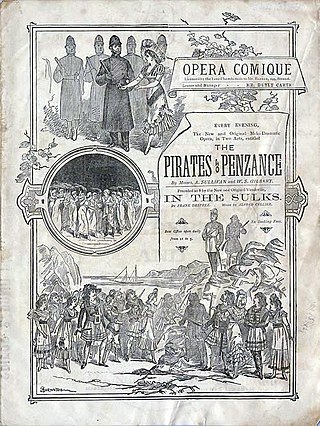
In the Sulks is a one-act comic opera with a libretto by Frank Desprez and music by Alfred Cellier. It was first performed at the Opera Comique on 21 February 1880; revived 3 April 1880 to 2 April 1881 as a curtain raiser to The Pirates of Penzance, and again from 25 April to 2 May 1881 and from 11 to 14 October 1881 as a curtain raiser to Patience. It was also performed from 21 February to 20 March 1880 at matinees with the Children's Pinafore. The piece also toured frequently from 1879 to 1882.
Uncle Samuel is a one-act comic opera with a libretto by Arthur Law and music by George Grossmith. It was first produced at the Opera Comique on 3 May 1881 to 8 October 1881, as companion piece to Patience. The piece also toured from December 1887 to June 1888 as a companion piece to H.M.S. Pinafore.

A Private Wire is a one-act musical "vaudeville" operetta with a libretto by Frank Desprez and Arnold Felix and music by Percy Reeve. It was first produced at the Savoy Theatre on 31 March 1883 to 1 January 1884 as a companion piece to Gilbert and Sullivan's Iolanthe. The piece also toured from March to July 1884.
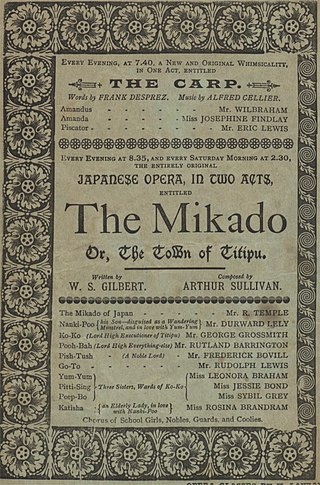
The Carp is a one-act comic opera with a libretto by Frank Desprez and music by Alfred Cellier. It was first produced at the Savoy Theatre from 13 February 1886 to 19 January 1887, as a companion piece to The Mikado. It was then revived as companion to Ruddigore from 21 February 1887 to 5 November 1887. The piece also toured throughout 1888.

Quite an Adventure is a one-act comic opera by Edward Solomon with a libretto by Frank Desprez. The farcical plot concerns a house-guest who mistakes his hostess's husband for an intruder.
Weather or No is a one-act comic opera, styled a "musical duologue", by Bertram Luard-Selby with a libretto by Adrian Ross and William Beach. It was produced at the Savoy Theatre from 10 August 1896 to 17 February 1897 as a companion piece to The Mikado, and from 2 March 1897 to 24 April 1897 with His Majesty, for a total of 209 performances.

Old Sarah is a one-act comic opera composed by François Cellier with a libretto by Harry Greenbank.
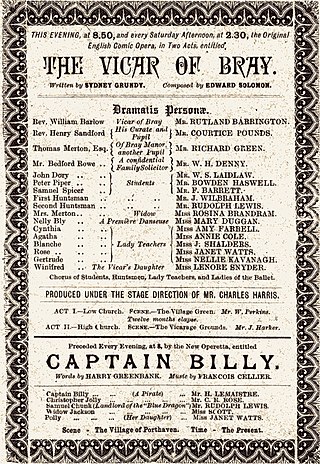
Captain Billy is a one-act comic opera with a libretto by Harry Greenbank and music by François Cellier. It was first performed at the Savoy Theatre on 24 September 1891 until 16 January 1892, as a curtain raiser to The Nautch Girl, and from 1 February 1892 to 18 June 1892, as a curtain raiser to The Vicar of Bray, for a total of 217 performances.
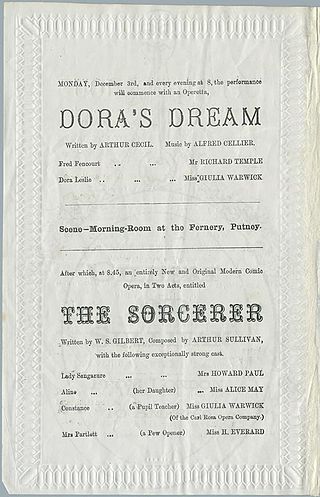
Dora's Dream is a one-act operetta, with music composed by Alfred Cellier and a libretto by Arthur Cecil.
The Outpost is an opera or operetta by the composer Hamilton Clarke with a libretto by A. O'D. Bartholeyns. The story is an adaptation of the Singspiel Der vierjährige Posten by Theodor Körner with music by Franz Schubert.

Philip Michael Faraday was an English lawyer, surveyor, composer, organist and theatrical producer. He composed one of the last Savoy operas, staged several long-running shows in the West End of London, and wrote a book about local taxation that was for many years the standard work on the subject. After sustaining financial losses on shows that he produced in the 1910s, Faraday declared bankruptcy in 1914. In later years he rebuilt his fortune through his legal and valuation work and resumed theatrical production.
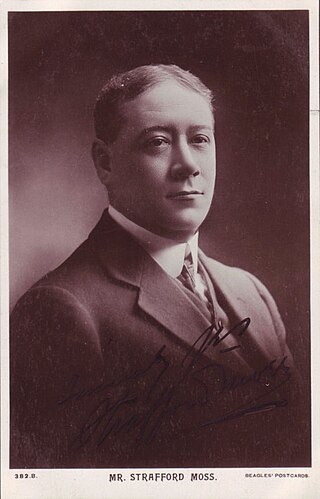
Frederick Strafford Moss was a British tenor and actor. He appeared in the Savoy operas of Gilbert and Sullivan from 1897 to 1913, mainly in touring companies of the D'Oyly Carte Opera Company, following which he had a career in musical theatre on the West End stage until 1931.
Frederick Fenn was an English playwright, journalist and drama critic. He was the librettist for one of the last Savoy Operas, A Welsh Sunset (1908), and had his greatest success with the musical comedy The Girl in the Taxi (1912).
References
- A Welsh Sunset homepage at the G&S Archive
- Farrell, Scott (2009). The C. H. Workman Productions: A Centenary Review of the Final Savoy Operas. Scott Farrell.